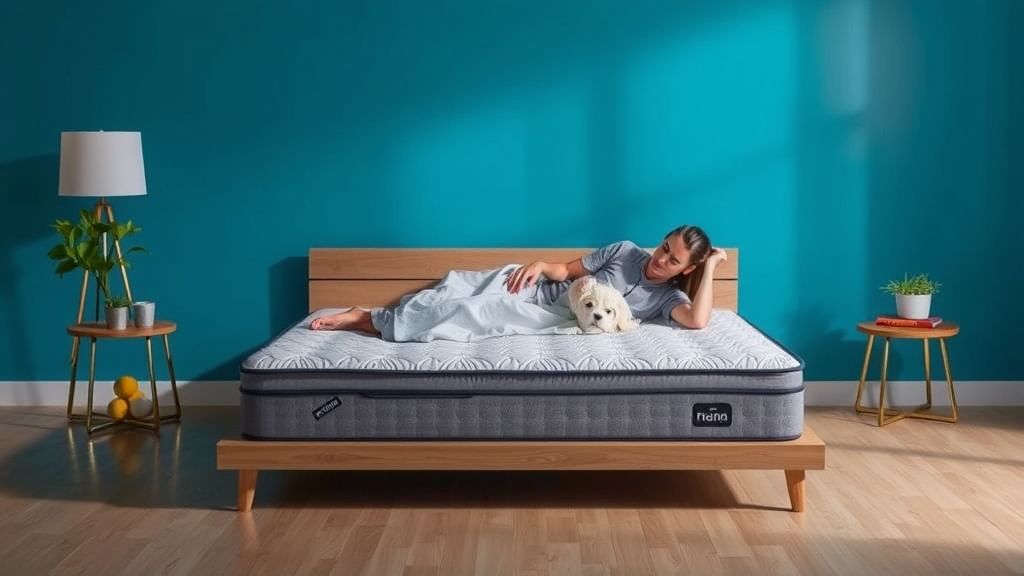Physical Address
304 North Cardinal St.
Dorchester Center, MA 02124
Physical Address
304 North Cardinal St.
Dorchester Center, MA 02124
When choosing a mattress for heavy people, look for high-density materials, strong support systems, and durable construction to ensure long-lasting comfort.

When selecting (a) mattress for heavier individuals, several critical factors can significantly impact sleep quality and overall comfort. Understanding these key features helps make informed purchasing decisions that support both physical health and restful sleep.
Mattresses designed for heavy sleepers must provide exceptional structural support. Standard mattresses often compress quickly under increased body weight, leading to inadequate spinal alignment and potential discomfort. Look for mattresses with: (1) durability, (2) firmness and (3) advanced materials that enhance support. However, one must consider personal preferences, as comfort varies from person to person. Although weight capacity is crucial, it is also essential to evaluate other elements, because this will ultimately influence the quality of sleep. Thus, ensuring that a mattress meets these criteria is vital for achieving a restful night.
High-density foam layers (a minimum of 4-5 lbs (per cubic foot)) can be quite beneficial; however, their weight may pose challenges. Although this material offers excellent support, it is crucial to consider its density, because it affects overall performance. This, combined with other factors, makes selection important.
Robust innerspring systems (which feature thicker coils) are designed to support a weight capacity exceeding 250-300 pounds per side. However, this design offers enhanced durability and comfort; because of these factors, many consumers prefer such mattresses. Although some may argue that alternative materials provide better support, the traditional innerspring remains popular.
Material composition plays a crucial role (1) in durability and comfort; however, the recommended materials—such as those that provide optimal support—are essential. Although some might overlook this aspect, it significantly affects overall user experience. Because of this, careful consideration in selecting appropriate materials is necessary.
| Material | Benefits |
|---|---|
| High-Density Memory Foam | Pressure relief (1), body contouring (2) and enhanced support; however, these features are essential. Although many products claim to offer such benefits, their effectiveness can vary significantly. This variability is often due to the materials used and the design principles employed. Because of this, consumers should carefully consider their options before making a decision, but they should also be aware of the potential for misleading claims in the market. |
| Latex | Responsive (and) durable (with) natural cooling properties |
| Hybrid Mattresses | Combines (innerspring) support with foam comfort layers; however, this approach offers a unique blend of benefits. Although some may prefer traditional methods, many appreciate the balance achieved by this combination. The layers, while providing cushioning, do not compromise on support—because they work in harmony, enhancing overall sleep quality. |
Heavier individuals (those who weigh more) often experience (1) increased heat retention; however, this can lead to discomfort during sleep. When searching for suitable mattresses, it is crucial to consider specific features that cater to such needs (because comfort is paramount). Although many options exist, not all are created equal and some may not provide the necessary support. But, finding the right one can significantly enhance sleep quality.
Investing in (an) mattress with exceptional durability is paramount; consider these indicators of durability: however, one must also evaluate the materials used, because they significantly impact longevity. This is essential for ensuring comfort and support, although some may prioritize price over quality. Ultimately, the maintaining should reflect individual needs and preferences, but durability should not be overlooked.
Contrary to popular belief (1), heavier individuals often require a firmer mattress to prevent excessive sinking and maintain proper spinal alignment. Medium-firm to firm mattresses typically provide the most consistent support; however, they prevent uncomfortable “bottoming out” (2) that can occur with softer surfaces. Although some might prefer plush options, this can lead to discomfort over time. Because of the need for stability, individuals should carefully consider their choices. But, it is essential to test different types of mattresses to find the best fit for one’s unique body type.
When choosing (a) mattress for heavier individuals, understanding nuanced requirements becomes crucial for ensuring comfort, support and long-term durability. The right mattress can significantly impact sleep quality and overall physical well-being; thus, the selection process is paramount for those with higher body weight (however, this can be quite challenging).
Critical material considerations for weight support are essential. Mattress materials (specifically) play fundamental roles in providing adequate support for heavier individuals. High-density memory foam and hybrid mattresses, which have robust coil systems, tend to offer the most reliable performance. Look for materials with densities of at least 4-5 pounds per cubic foot, which provide enhanced durability and prevent premature sagging (although some may argue that personal preference should also be considered).
High-density memory foam (5+ lbs/cubic foot) is often praised for its exceptional support; however, some may find it too firm. This material can conform to the body, providing comfort, although it may retain heat because of its density. It’s important to consider personal preferences (and sleeping habits) when selecting this type of foam.
Selecting (the) appropriate mattress for heavier individuals entails more than merely making a purchasing choice—it represents an investment in long-term sleep health and personal comfort. By emphasizing critical features such as robust support, high-density materials and thoughtful construction, heavier sleepers can discover a mattress that truly accommodates their unique physiological needs.
The process of finding the ideal mattress (requires) careful consideration of numerous factors. Dense memory foam, reinforced hybrid designs and mattresses with enhanced support cores are not just suggestions; they are vital for ensuring proper spinal alignment, pressure relief and durability. Although mattress thickness, edge support and material quality play significant roles in creating a sleep surface, this can consistently endure greater body weights without compromising comfort or structural integrity.